

This week The English Apple Man was delighted to receive an unexpected email from a lady in Scotland!
Good afternoon,
I have been enjoying your website and am delighted by the huge amount of excellent, interesting apple knowledge you put on it.
I am a national collection holder for heritage Scottish apples and pears and Scottish cider apples. My ambition has been to create the environment for commercially grown apples in Scotland again and to encourage farmers, cider makers, apple juice producers to grow apples on a commercial scale again.
Catherine Drummond-Herdman
The Scottish apple scene-Catherine continues!
Looking back to 2008 when I first realised that orchards were possible to be productive again in Scotland I feel we have made huge progress. I have set up a growers group, Scottish Apples and there are now quite a few large growers, mainly making cider.
Anyway, apples are my favourite subject and I could go on! But what I was really emailing you to ask was if you could kindly have passed on my email details to Professor Barrie Juniper who, as you know, is the author of the Story of the Extraordinary Apple book?
I have long wanted to travel to the Tien Shan mountains to see the wild apple forests and this year coincidentally I have been contacted by a student who also wanted to go and I thought perhaps two of us would equate to an expedition. I am not sure what the possibility of travel to Kazakhstan will be in September, but I am so keen to see the forests and hear more about the work of Aimak Dzangaliev.
Dzangaliev, now nearly 100 years old, is a botanist in Almaty who for much of his life has been championing the virtues of Kazakh apples.
Back to English Orchards
From my agronomist friend in West Midlands
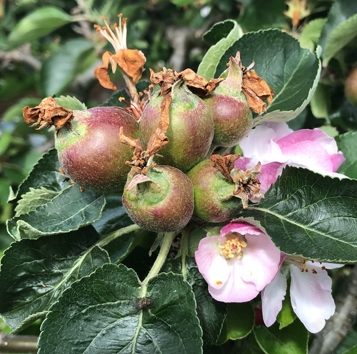 "In the West Midlands, flowering was prolonged and there was still flower on Bramleys this week (picture attached). The set is not as good as we first thought, but some thinning chemicals have been applied, although conditions have been rather cool for the best effects of the 6-BA products.
"In the West Midlands, flowering was prolonged and there was still flower on Bramleys this week (picture attached). The set is not as good as we first thought, but some thinning chemicals have been applied, although conditions have been rather cool for the best effects of the 6-BA products.
Gala set is OK, heavy in places but amounts of flower were quite variable. We have significant areas of the variety Junami, which looked like it was going to set a very big crop after a light crop last year, but the set has not been good, so chemical thinning has not been necessary. Jazz has been a heavy set in places and thinners have been applied. Not a great deal of Cox still grown, but the better clones such as Lavera have set strongly, and even some of the older Queen Cox trees have set a decent crop (June drop yet to come of course!)
A mild winter has meant quite a few caterpillars and aphids pre-flowering and despite another dry April, scab is showing in some susceptible varieties (leaf scab picture attached). Long dry periods followed by rain means a massive release of spores in one go, and it is testing our fungicides very strongly. Bring back springs with regular showers please! Powdery mildew is looking healthy on susceptible varieties and thoughts are turning to Codling moth control, whether by conventional insecticides or a combination of mating disruption and use of granulosis virus.
Below: left; measuring fruitlet size with a gauge and right; hail damage in West Midlands
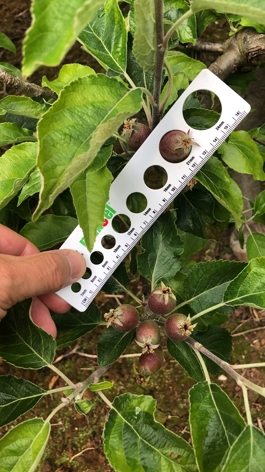
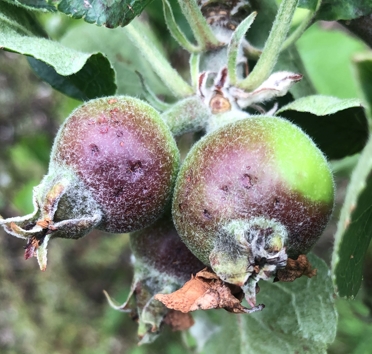
"Growing the crop is probably most of my growers' least worries at the moment. They are more worried about whether they will have enough pickers and will they see the needed increase in prices paid for fruit to cover the very significant inflationary costs they are incurring and the extra energy costs the storage facilities and pack houses will have to pay. If they can't make money, they will stop growing apples"
From my agronomist friend in Kent...
"Here is my summary of the main varieties"
Cox - generally heavy, requires thinning on majority of sites
Gala - will be a good crop but lightest for years. Needs very little thinning. Quality thin later is most that is required. Tree growth vigorous due to weather.
Braeburn - Good/heavy crop on most sites. Quite big variability from tree to tree. Growers reluctant to thin due to danger of oversized fruit
Below: see photos:- photo 1 Braeburn not requiring thinning, photo 2 Braeburn on an adjacent tree needing thinning,
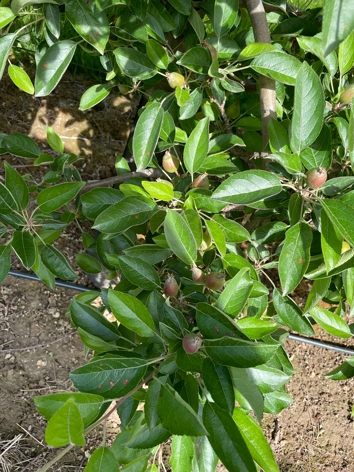
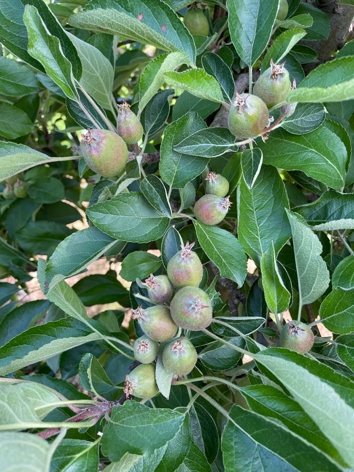
Bramley - good crop having been dreadful last year. Thinning quite well naturally.
Pears - light on most sites, but quality looks good.
Below: Bramley in West Kent damaged from hail on Wednesday.
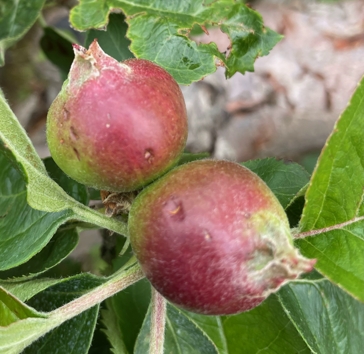 Some hail in West Kent (Marden, Staplehurst, Paddock Wood) area on Wednesday, but not dreadful. Will need hand thinning though, which growers are reluctant to carry out due to lack of/expense of labour.
Some hail in West Kent (Marden, Staplehurst, Paddock Wood) area on Wednesday, but not dreadful. Will need hand thinning though, which growers are reluctant to carry out due to lack of/expense of labour.
Thinning!
The English Apple Man reminds readers with apple trees in their garden should thin the fruitlets where necessary. To many apples on the tree will reduce fruit size this season and almost certainly put stress on the tree resulting in a reduction of fruit bud for next season!
When the apple set is heavy, most buds will set 5+ apples, and this needs to be reduced to "one or two" per bunch. It is important to remove the 'king apple' at the centre and select a strong fruitlet from the rest.
The 'old rule of thumb' was thin to each apple 'a hand apart'
The main reason garden apple trees do not crop heavily every year is due to. lack of thinning
Below: left; Un-thinned and right; thinned Red Devil apples in The English Apple Man's Gqrden!
![]() That is all for this week
That is all for this week
Take care
The English Apple Man